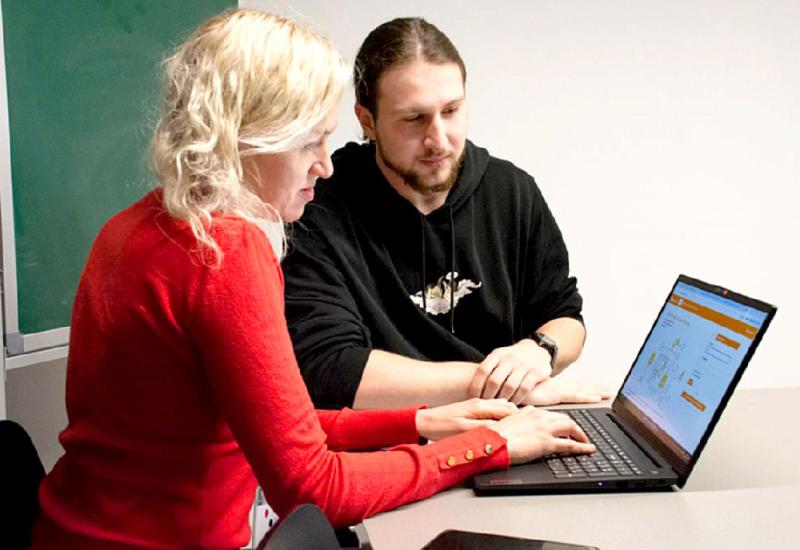In March 2025, the KPI Scientific and Technical Library offered researchers a new service called "Data Steward" . Its implementation was made possible thanks to the participation of Igor Sikorsky KPI in the Erasmus+ Open4UA project – Open Science for Higher Education.
What are the benefits of this service for researchers?
“Data Steward” will help:
– save time through effective scientific data management methods;
– prepare a research data management plan in accordance with grantor requirements;
– improve collaboration with other researchers;
– ensure reliable long-term storage and access to data.
How it all began
In March 2024, researchers from Igor Sikorsky Kyiv Polytechnic Institute, as part of a delegation from Ukraine within the Open4UA project, visited Delft University of Technology (Netherlands), which has valuable experience in working with scientific data. There, a team of data stewards helps researchers develop data management plans, find existing datasets, and disseminate primary research data.
The coordinator of this team works in the university library, and at the faculty level, researchers are supported by specialists who are well versed in the specifics of data management in their fields. It was then that the idea arose to introduce a similar service for Ukrainian researchers.
Data stewards – who are they?
Data stewards are specialists who provide information support to researchers at all stages of the data life cycle. They advise scientists on various issues related to open science and research data management, help to comply with the institution's open science and data management policies, conduct educational events, and develop information materials.
At the library level, these specialists focus on metadata, open data repositories, and issues of research data preservation and dissemination. Data stewards help create data management plans (DMPs), teach how to use institutional and international data repositories, and more.
At the faculty or institute level, stewards work with research data within specific scientific fields, adapting general principles to their specificities. For example, in the natural sciences, the focus is on data formats for modeling used for modeling and experimental research, and in the social sciences, the focus is on ethics and anonymization of personal data.
Main functions of stewards
Policy development and implementation. Data stewards participate in the development and implementation of policies for the proper management of research data, for example, in accordance with FAIR principles, and ensure that research data complies with regulatory documents, standards, and institutional values.
Documentation and metadata. Specialists ensure that metadata is formatted in accordance with generally accepted standards (Dublin Core, DataCite, ISO 19115, etc.), maintain dictionaries for data organization, and help use identifiers (DOI, ORCID, ROR) to improve citation and data accessibility.
Data access management. They help ensure the necessary levels of data access in accordance with the research data management plan, while complying with security and ethical rules. They coordinate data exchange processes and compliance with licensing rules (Creative Commons, Open Data Licenses, etc.), and interact with researchers regarding data access and reuse.
Interaction with researchers. Stewards advise on best practices for data management, assist in the preparation of research data management plans (DMPs), conduct training, and promote open science and open access.
Integration and interoperability. They ensure data compatibility between systems (CRIS, repositories) and implement API standards and protocols (OAI-PMH, REST, JSON, XML).
Analytics and monitoring. Monitor data usage, analyze the quality, impact, and key performance indicators (KPIs) of data-related research activities.
What is the value of the service for the academic community?
The Data Steward service was first introduced in Ukraine at Igor Sikorsky Kyiv Polytechnic Institute. This is a systematic attempt to introduce support for researchers in the field of scientific data management at the institutional level. This experience:
– promotes the dissemination of European approaches in Ukrainian practice;
– improves the quality of research and trust in results;
– shapes a new research culture, where data is not just an appendix to an article, but a full-fledged result of scientific activity.
At the KPI Library (https://www.library.kpi.ua/open-science/about-research-data-management), a research data management specialist has already begun advising our researchers.
The KPI Library has also developed, conducted, and provided access to a series of webinars that reveal various aspects of research data management https://www.youtube.com/watch?v=v9AkXhHzkJc.
How to obtain the service
All registered users of the KPI Library can receive comprehensive information support for the research data management process. Our specialists consult and organize training events on various aspects of research data management. This service is free of charge and available in person and remotely.
To receive individual consultation or order training, contact a research data management specialist in a way that is convenient for you:
– in person: at the library (1st floor, room 1.5);
– by email: data.library.kpi@gmail.com;
– or order a consultation/training event using Zoom or in person.

